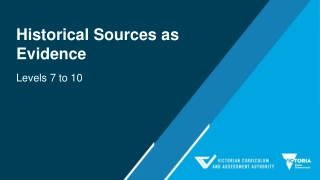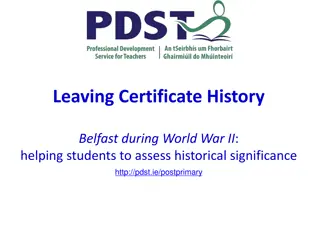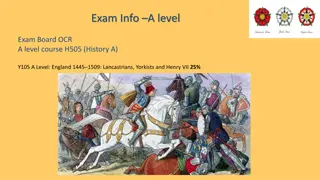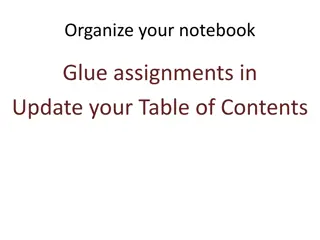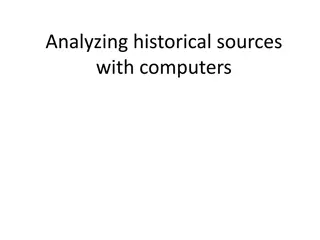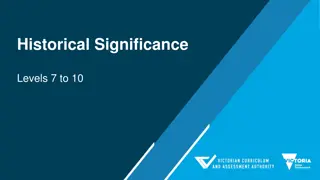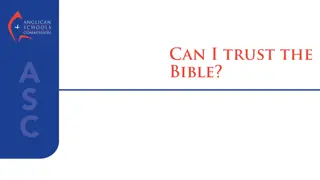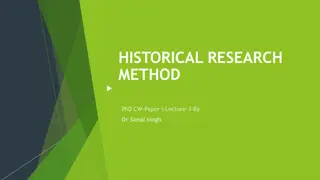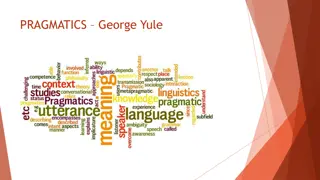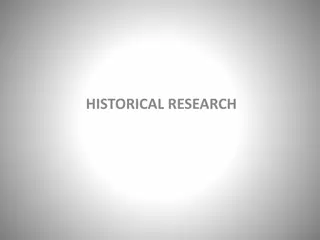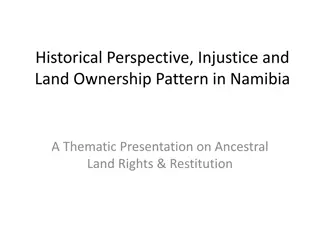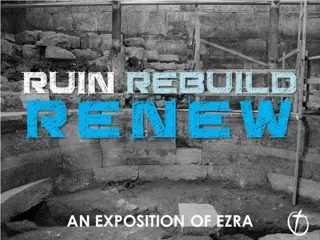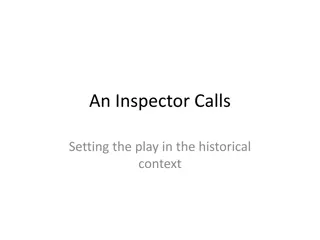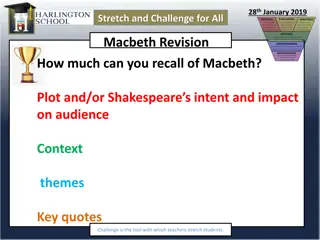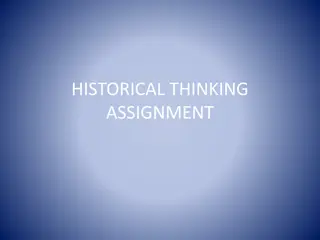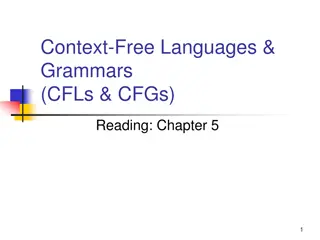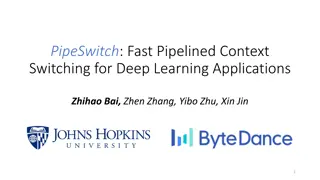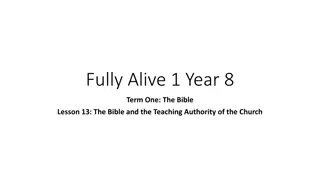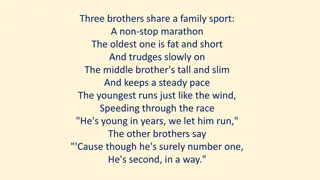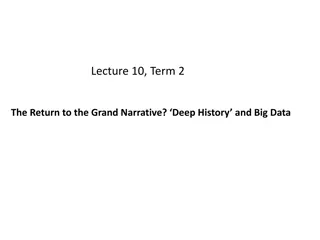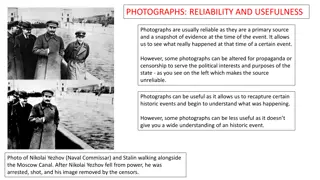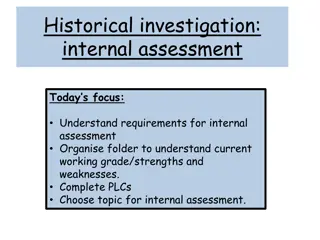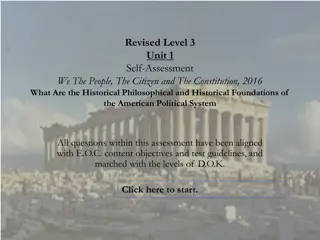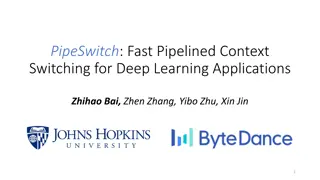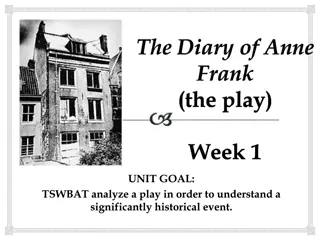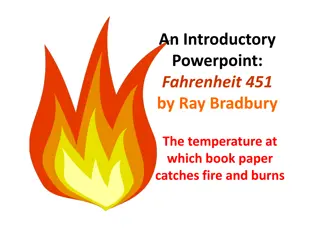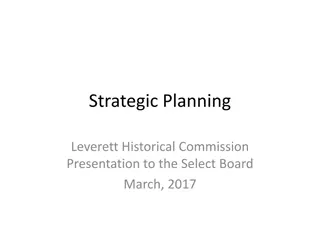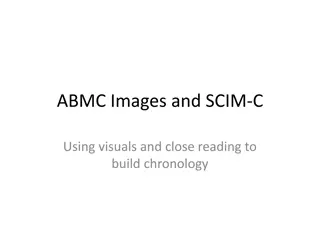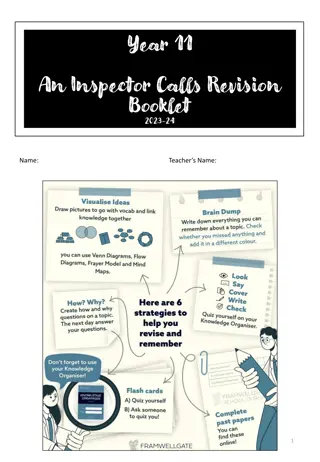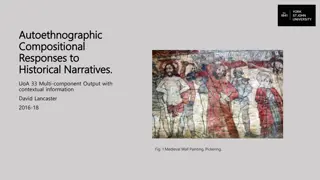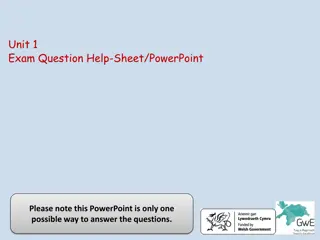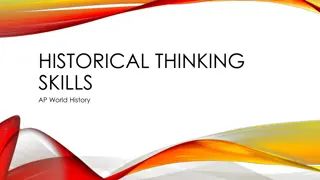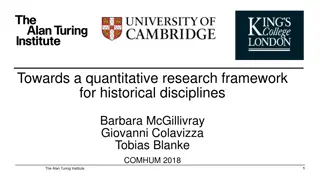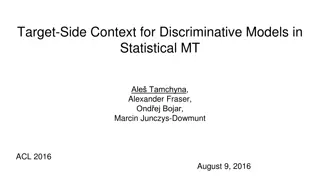Historical Sources as Evidence
Explore the importance of historical sources as evidence in the Victorian Curriculum History context, focusing on how students analyze, evaluate, and utilize sources to create historical explanations and arguments. Discover the significance of primary and secondary sources, perspectives of historica
1 views • 46 slides
Challenges and Solutions in Implementing Historical Competencies in Teaching
Explore the complexities and obstacles faced in implementing historical competencies in teaching, as discussed by Jens Aage Poulsen, a senior lecturer and researcher at HistoryLab, University College Lillebaelt, Denmark. The content delves into competence-based curriculum, core historical competenci
0 views • 7 slides
Exploring Historical Significance of Belfast During World War II
Assisting students in assessing the historical significance of Belfast during World War II through an enquiry-focused approach. The content covers key aspects such as the impact of World War II on Belfast, its strategic importance, political leadership, the Belfast Blitz of 1941, and key terms relat
0 views • 32 slides
Wars of the Roses (1445-1461): Source Analysis on the Downfall of Henry VI
This content delves into the Wars of the Roses period (1445-1461) in England, focusing on the outbreak of conflicts, political turmoil, and the downfall of Henry VI. It includes an inquiry topic, sample paper question, and a detailed analysis of a historical source (Source A) by Jack Cade regarding
0 views • 16 slides
Exploring Historical Fiction: Elements and Examples
Discover the essence of historical fiction, its key elements, and examples like "Forrest Gump." Learn how plausibility and interpretation play pivotal roles in creating captivating narratives that blend fiction with historical events.
0 views • 11 slides
Exploring Historical Analysis with Digital Tools
Delve into the world of historical analysis using digital methods like digitization, metadata, OCR, and balancing challenges. Discover how tools like Antconc can aid in machine-driven inquiries, statistical analysis, and more to extract valuable insights from historical sources.
0 views • 13 slides
Understanding Historical Significance in Victorian Curriculum History
Exploring historical significance levels 7 to 10 in the Victorian Curriculum History, this content delves into the importance of evaluating the past, identifying patterns of change, and assessing the influence of individuals and groups. Students learn to analyze causes, effects, motives, and interpr
0 views • 48 slides
Examining the Reliability of Historical Texts: From The Bible to Socrates
Investigating the unparalleled popularity of the Bible, the historical significance of Christianity, the reliability of documents related to Socrates, and the critical analysis of potential mistakes in historical texts through comparisons and archaeological findings.
2 views • 13 slides
Understanding Historical Research Methods
Historical research is a systematic approach to investigating past events, developments, and experiences. It involves critical examination of evidence, interpretation of sources, and tracing of historical trends to gain insights into social changes. Various definitions by scholars like Kerlinger, Wh
1 views • 21 slides
Understanding Themes in "Tally's Blood": Historical Context and Prejudice
Delve into the themes of historical context and prejudice in "Tally's Blood," focusing on the immigrant experience in Scotland, the impact of The Great Depression, and the exploration of cultural identity. The play explores the challenges faced by Italian immigrants, the significance of the title "T
0 views • 101 slides
Overview of Pragmatics and Deixis According to George Yule
Pragmatics and Deixis are crucial aspects of language understanding, as explored by George Yule. Pragmatics focuses on the use of language in context, while Deixis involves pointing via language to convey meaning based on the immediate context. Deictic expressions play a significant role in face-to-
0 views • 19 slides
Understanding Historical Research: Methods, Purposes, and Aims
Historical research involves investigating past events systematically to provide a dynamic explanation, interpretation, and understanding of the past. It aims to uncover unknown aspects, answer unexplored questions, and link past happenings to the present to enrich human culture and encourage interd
0 views • 20 slides
Namibia's Ancestral Land Rights: Historical Injustice and Restitution
Explore the historical context of land ownership in Namibia, focusing on ancestral land rights, colonization processes, and the impact on indigenous populations. Learn about the notion of ancestral land, who should be considered indigenous, and the colonial modes of land acquisition. Uncover the str
0 views • 33 slides
Overview of Ezra: Historical Background and Key Details
Ezra and Nehemiah, two significant books written as one scroll in Hebrew, cover a historical period from 538-445 BC in Israel's history. The authorship of Ezra is traditionally attributed to both Ezra and Nehemiah, possibly also linked to the Chronicles. This period coincides with other biblical boo
0 views • 31 slides
Historical Context of "An Inspector Calls" Play
The play "An Inspector Calls" is set in 1912, just before the Titanic disaster and on the brink of World War One. The historical context depicts the societal class structure, Britain's imperial stature, labor unrest, and the emergence of the Labour Party. The play's setting reflects the prevailing s
0 views • 15 slides
Overview of Grammar Types and Chomsky Hierarchy
The four types of grammars are General, Context-Sensitive, Context-Free, and Linear grammars, each recognizing a specific set of languages. Chomsky Hierarchy categorizes these grammars into four levels, indicating subsets of languages they can recognize. Context-free grammars have specific productio
0 views • 17 slides
Macbeth Revision: Plot, Themes, and Context Exploration
Explore the key ideas, characters, and events in Shakespeare's Macbeth through an in-depth analysis of plot, context, themes, and the playwright's intent. Delve into the tragic hero concept, dramatic irony, and the portrayal of power dynamics, supported by key quotes and historical context.
1 views • 19 slides
Understanding Paragraph Organization in Historical Prose Writing
Explore the D-N-A structure of paragraph organization in historical prose writing, focusing on transitional words, revision strategies, and the inseparable connection between history and writing. Learn how to develop effective paragraphs that guide the reader through your historical narrative.
0 views • 18 slides
Key Historical Events and Perspectives
Explore significant historical moments such as the Kennedy Assassination, the First Moon Landing, and the FLQ Crisis, examining the impact of these events on society and the world. Discover the importance of historical thinking skills in analyzing causes, consequences, continuity, and change, as wel
1 views • 11 slides
Understanding Context-Free Languages and Grammars
Context-Free Languages and Grammars (CFLs & CFGs) are essential in theoretical computer science, providing a framework for recognizing non-regular languages. This content explores the distinction between regular and context-free languages, delves into the construction of language recognizers using c
0 views • 40 slides
PipeSwitch: Fast Context Switching for Deep Learning Applications
PipeSwitch introduces fast pipelined context switching for deep learning applications, aiming to enable GPU-efficient multiplexing of multiple DL tasks with fine-grained time-sharing. The goal is to achieve millisecond-scale context switching overhead and high throughput, addressing the challenges o
1 views • 38 slides
Understanding the Context of Bible Stories and Church Teachings
Explore the importance of context in understanding Bible stories and church teachings, including discussions on Magisterium, Sacred Tradition, and the role of the Church in interpreting scripture. Learn how context enhances our comprehension of religious texts and traditions. Delve into examples hig
0 views • 13 slides
Historical Events and Learnings in World War I Era
In this collection of historical topics, explore events such as the three brothers in a marathon, war strategies in World War I, and GCSE History lessons covering Germany and Britain. Learn about significant battles, alliances, and key figures from this era, including Kaiser Wilhelm II. A starter qu
0 views • 21 slides
The Role of History Writing in Contemporary Academia
The discussion revolves around the practice and purpose of history writing post-Enlightenment, exploring concepts such as human agency, historical change, and the historian's role. It questions the objectivity of historical facts, delves into the influence of the historian's environment, and contemp
0 views • 28 slides
Reliability and Usefulness of Historical Sources
Photographs, diary entries, and letters are valuable historical sources, providing insights into past events. While photographs offer a snapshot of the truth, they can also be manipulated. Diary entries reflect personal experiences authentically but may lack objective facts. Letters serve as private
0 views • 11 slides
Requirements for Historical Investigation Internal Assessment
Understand the 25% weightage internal assessment comprising 3 sections for a historical investigation. Focus on source evaluation, investigation, and reflection within a 2,200-word limit. Choose a historical topic, analyze primary and secondary sources, and consider causation, consequence, continuit
0 views • 18 slides
American Political System - Historical Foundations Self-Assessment
Explore historical, philosophical, and foundational aspects of the American political system through a self-assessment quiz. Assess your knowledge on constitutional government, limited government, and governance derived from the people as outlined by key historical figures.
0 views • 77 slides
Understanding Historical Context in Skills Development Discourses
Exploring the evolution of apprenticeship and skills development through historical sociology, historical futures, modes of justification, and complexity concepts. Emphasizing the importance of nuanced historical understanding to navigate contemporary challenges in South Africa's skills development
0 views • 29 slides
Efficient Context Switching for Deep Learning Applications Using PipeSwitch
PipeSwitch is a solution that enables fast and efficient context switching for deep learning applications, aiming to multiplex multiple DL apps on GPUs with minimal latency. It addresses the challenges of low GPU cluster utilization, high context switching overhead, and drawbacks of existing solutio
0 views • 46 slides
Understanding the Historical Context of "The Diary of Anne Frank
The play "The Diary of Anne Frank" is based on the true story of a young Jewish girl named Anne Frank during the Holocaust in World War II. Through analyzing the play, students explore the significant historical event of the Holocaust, where millions of Jews were systematically persecuted and killed
0 views • 13 slides
Fahrenheit 451: Exploring Themes and Historical Context
Explore the themes of censorship, totalitarianism, and social criticism in Ray Bradbury's Fahrenheit 451. Delve into the historical context of the 1950s, a time marked by post-World War II anxieties, technological advancements, and the specter of nuclear war. Discover how the novel warns against the
0 views • 20 slides
Leverett Historical Commission Strategic Planning Presentation Overview
Leverett Historical Commission identifies issues with ad hoc requests, lack of clarity on historical property significance, and inadequate maintenance plans. A strategic plan is needed to define assets, determine significance, create guidelines, prioritize restoration efforts, and establish funding
0 views • 9 slides
Analyzing Historical Documents Using SCIM-C Model
The SCIM-C model provides a structured approach for analyzing historical documents through summarizing, contextualizing, inferring, monitoring, and corroborating information. It guides the reader in understanding the type of document, specific details provided, subject matter, audience, purpose, pro
0 views • 10 slides
Exploring the Historical Context of 'An Inspector Calls' by JB Priestley
Explore the historical context surrounding the time period in which JB Priestley's play "An Inspector Calls" is set and was written. Delve into the significant events such as the sinking of the Titanic, World War One and World War Two, the class system, socialism vs capitalism, and the changing role
0 views • 30 slides
Understanding Sexual Tourism in the Historical Context of Kosovo
Sexual tourism, a form of legal prostitution, has historical roots in Kosovo and its neighboring regions. This practice involves offering companionship and escort services to business travelers and tourists. The presence of prostitution in ancient Illyria suggests a long-standing tradition of sexual
0 views • 10 slides
Exploring Historical Narratives through Music and Art
This submission presents two original compositions that delve into historical narratives through a unique blend of music and visual art. The compositions aim to reinterpret stories from the past, creating innovative structures and forms. By intertwining various perspectives and utilizing cinematic t
0 views • 8 slides
Historical Source Analysis Exam Questions Overview
The provided content outlines exam questions related to historical sources, guiding students on analyzing, evaluating, and interpreting information from different sources. The questions cover a range of topics such as learning from sources, assessing accuracy, understanding significance, and making
0 views • 12 slides
Developing Historical Thinking Skills in AP World History
AP History classes aim to cultivate apprentice historians by fostering historical thinking skills (HTS). These skills include Chronological Reasoning, Comparison and Contextualization, Crafting Historical Arguments, and Historical Interpretation. Each skill set equips students with the ability to an
0 views • 15 slides
Quantitative Research Framework for Historical Disciplines
Scholarly communities in historical disciplines are combining quantitative and qualitative methods to study phenomena that change over time. The proposed general methodological reflection aims to enhance research in historical linguistics through quantitatively driven models and claims. Quantitative
0 views • 18 slides
Importance of Context in Statistical Machine Translation
Understanding the significance of context in machine translation is crucial for improving accuracy and disambiguating word sense. This research delves into the impact of target-side context for discriminative models in statistical machine translation, showcasing how context influences model performa
0 views • 29 slides
